Book contents
- Frontmatter
- Dedication
- Contents
- Preface
- Acknowledgements
- About the Contributors
- Chapter 1 M.B. Hooker and Southeast Asian Law: Path-breaking Passions
- Chapter 2 Asian Thought and Legal Diversity
- Chapter 3 Comparative Law, Anti-Essentialism and Intersectionality: Reflections from Southeast Asia in Search of an Elusive Balance
- Chapter 4 Legal Pluralism and Legal Anthropology: Experiences from Indonesia
- Chapter 5 Mapping the Relationship of Competing Legal Traditions in the Era of Transnationalism in Indonesia
- Chapter 6 Indonesia's Weak State Courts and Weak Law Fare Poorly in a Pluralist Commercial World
- Chapter 7 When Laws Are Not Enough: Ethics, Aesthetics, and Intra-Religious Pluralism in Contemporary Indonesia
- Chapter 8 Legal Pluralism and the Constitutional Position of East Malaysia's Indigenous Peoples: The View from the Longhouse
- Chapter 9 Sharia, State and Legal Pluralism in Indonesia: How Law Can You Go?
- Chapter 10 Negotiating Legal Pluralism in Court: Fatwa and the Crime of Blasphemy in Indonesia
- Chapter 11 Islamic Law in Israel: A Case Study in Legal Pluralism
- Chapter 12 The Road to Democracy Goes Through Religious Pluralism: The Indonesian Case and Thoughts on Post-Mubarak Egypt
Chapter 5 - Mapping the Relationship of Competing Legal Traditions in the Era of Transnationalism in Indonesia
Published online by Cambridge University Press: 12 January 2018
- Frontmatter
- Dedication
- Contents
- Preface
- Acknowledgements
- About the Contributors
- Chapter 1 M.B. Hooker and Southeast Asian Law: Path-breaking Passions
- Chapter 2 Asian Thought and Legal Diversity
- Chapter 3 Comparative Law, Anti-Essentialism and Intersectionality: Reflections from Southeast Asia in Search of an Elusive Balance
- Chapter 4 Legal Pluralism and Legal Anthropology: Experiences from Indonesia
- Chapter 5 Mapping the Relationship of Competing Legal Traditions in the Era of Transnationalism in Indonesia
- Chapter 6 Indonesia's Weak State Courts and Weak Law Fare Poorly in a Pluralist Commercial World
- Chapter 7 When Laws Are Not Enough: Ethics, Aesthetics, and Intra-Religious Pluralism in Contemporary Indonesia
- Chapter 8 Legal Pluralism and the Constitutional Position of East Malaysia's Indigenous Peoples: The View from the Longhouse
- Chapter 9 Sharia, State and Legal Pluralism in Indonesia: How Law Can You Go?
- Chapter 10 Negotiating Legal Pluralism in Court: Fatwa and the Crime of Blasphemy in Indonesia
- Chapter 11 Islamic Law in Israel: A Case Study in Legal Pluralism
- Chapter 12 The Road to Democracy Goes Through Religious Pluralism: The Indonesian Case and Thoughts on Post-Mubarak Egypt
Summary
When there is plural normativity, competition occurs between different legal traditions. This seems the direct result of the plurality of norms itself, which leads to conflicts of law, especially on interpersonal matters among parties with different legal traditions. The current direction of legal pluralism studies seems to follow this trend, where the competition between different laws existing within national law occupies the central theme. The state factor is here understandably dominant since the study is preoccupied mainly with the state's role in the encounters and its efforts in the process of conflict resolution. Be that as it may, the approach used in this kind of study is always characteristically topdown, where the state, through its formal laws, is viewed as the main agent for the resolution of conflicts of laws. In our view, however, this method puts too much emphasis on the role of the state and neglects the real societal factors which lead people often to take active roles in the process of rapprochement between competing legal traditions. Using a top-down approach in the analysis of legal conflicts will therefore lead to the dire consequence of overlooking many actors and stakeholders involved in encounters between traditions.
In the context of present-day Indonesia, the situation of legal pluralism cannot be described as a static phenomenon where the competition between different legal traditions is understood as merely a domestic, single encounter between state law and non-state normative orderings. Especially in this new era where transnationalization overwhelms the nationalistic trend in the development of national law, the encroachment of international norms in the domestic sphere appears inescapable, with the result that the discussion of legal pluralism should not disregard the role and position of international law in the country's legal system. The discussion of competing legal traditions should therefore not only include those derived from domestic laws but also that of international law, as it is involved in the process of national law making.
- Type
- Chapter
- Information
- Pluralism, Transnationalism and Culture in Asian LawA Book in Honour of M.B. Hooker, pp. 90 - 115Publisher: ISEAS–Yusof Ishak InstitutePrint publication year: 2017

